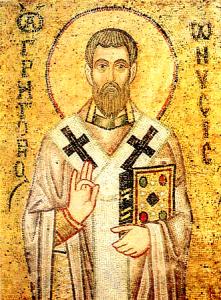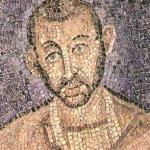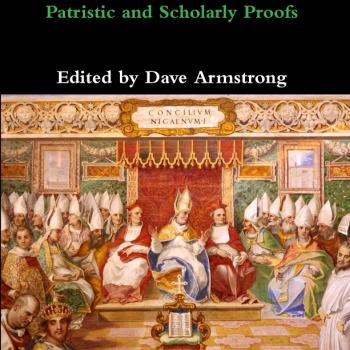
Baptism, then, is a purification from sins, a remission of trespasses, a cause of renovation and regeneration. . . . the child of regeneration has nothing for which to answer, being released by royal bounty from accountability. . . . Let us however, if it seems well, persevere in enquiring more fully and more minutely concerning Baptism, starting, as from the fountain-head, from the Scriptural declaration, Unless a man be born of water and of the Spirit, he cannot enter into the kingdom of God.
(On the Baptism of Christ)
Now herein, by that wondrous sacrifice, Elijah clearly proclaimed to us the sacramental rite of Baptism that should afterwards be instituted. For the fire was kindled by water thrice poured upon it, so that it is clearly shown that where the mystic water is, there is the kindling, warm, and fiery Spirit, that burns up the ungodly, and illuminates the faithful. Yes, and yet again his disciple Elisha, when Naaman the Syrian, who was diseased with leprosy, had come to him as a suppliant, cleanses the sick man by washing him in Jordan , clearly indicating what should come, both by the use of water generally, and by the dipping in the river in particular. For Jordan alone of rivers, receiving in itself the first-fruits of sanctification and benediction, conveyed in its channel to the whole world, as it were from some fount in the type afforded by itself, the grace of Baptism. These then are indications in deed and act of regeneration by Baptism. . . . we, putting off our sins like some poor and patched garment, are clothed in the holy and most fair garment of regeneration. (On the Baptism of Christ)
These are the words of a soul truly regenerated: these are the utterances of the newly-baptized man, . . . (On the Baptism of Christ)
***
“Please Hit ‘Subscribe’”! If you have received benefit from this or any of my other 4,800+ articles, please follow my blog by signing up (with your email address) on the sidebar to the right (you may have to scroll down a bit), above where there is an icon bar, “Sign Me Up!”: to receive notice when I post a new blog article. This is the equivalent of subscribing to a YouTube channel. My blog was rated #1 for Christian sites by leading AI tool, ChatGPT: endorsed by influential Protestant blogger Adrian Warnock. Please also consider following me on Twitter / X and purchasing one or more of my 55 books. All of this helps me get more exposure, and (however little!) more income for my full-time apologetics work. Thanks so much and happy reading!
***
We believe, then, even as the Lord set forth the Faith to His Disciples, when He said, Go, teach all nations, baptizing them in the name of the Father, and of the Son, and of the Holy Ghost Matthew 28:19 .
This is the word of the mystery whereby through the new birth from above our nature is transformed from the corruptible to the incorruptible, being renewed from the old man,
according to the image of Him who created
at the beginning the likeness to the Godhead. (Against Eunomius, Book II, 1)
Acting as a guide to those who approach the mystery.
This may well be said of Apollos who watered what Paul planted. For the Apostle plants by his guidance , and Apollos, when he baptizes, waters by Sacramental regeneration, bringing to the mystery those who were instructed by Paul. Thus he places on a level with Apollos that Spirit Who perfects men through baptism. (Against Eunomius, Book II, 15)
There are in us three births, whereby human nature is quickened, one of the body, another in the sacrament of regeneration, another by that resurrection of the dead for which we look, He is first-born in all three:— of the twofold regeneration which is wrought by two (by baptism and by the resurrection), . . . (Against Eunomius, Book IV, 3)
. . . the dispensation of the washing (whether we choose to call it baptism, or illumination, or regeneration; for we make the name no subject of controversy) is a part of our revealed doctrines . . . (The Great Catechism, Part II, The Incarnation, ch. 32)
Observe, then, that it is necessary for us to rehearse beforehand in the water the grace of the resurrection, to the intent that we may understand that, as far as facility goes, it is the same thing for us to be baptized with water and to rise again from death. (The Great Catechism: Part III, The Sacraments, 35)
Now the doctrine of the Lord is this: Go,
He said, teach all nations, baptizing them in the name of the Father, and of the Son, and of the Holy Ghost.
Since, then, in the case of those who are regenerate from death to eternal life, it is through the Holy Trinity that the life-giving power is bestowed on those who with faith are deemed worthy of the grace, and in like manner the grace is imperfect, if any one, whichever it be, of the names of the Holy Trinity be omitted in the saving baptism— for the sacrament of regeneration is not completed in the Son and the Father alone without the Spirit: nor is the perfect boon of life imparted to Baptism in the Father and the Spirit, if the name of the Son be suppressed: . . . (Letter 2: To the City of Sebasteia)
*
Practical Matters: I run the most comprehensive “one-stop” Catholic apologetics site: rated #1 for Christian sites by leading AI tool, ChatGPT — endorsed by popular Protestant blogger Adrian Warnock. Perhaps some of my 4,800+ free online articles or fifty-five books have helped you (by God’s grace) to decide to become Catholic or to return to the Church, or better understand some doctrines and why we believe them.
Or you may believe my work is worthy to support for the purpose of apologetics and evangelism in general. If so, please seriously consider a much-needed financial contribution. I’m always in need of more funds: especially monthly support. “The laborer is worthy of his wages” (1 Tim 5:18, NKJV). 1 December 2021 was my 20th anniversary as a full-time Catholic apologist, and February 2022 marked the 25th anniversary of my blog.
PayPal donations are the easiest: just send to my email address: [email protected]. Here’s also a second page to get to PayPal. You’ll see the term “Catholic Used Book Service”, which is my old side-business. To learn about the different methods of contributing (including Zelle), see my page: About Catholic Apologist Dave Armstrong / Donation Information. Thanks a million from the bottom of my heart!
*
***
*
Photo credit: 11th-century mosaic of St. Gregory of Nyssa. Saint Sophia Cathedral in Kyiv, Ukraine [source] [public domain / Wikimedia Commons]
Summary: I document the views of St. Gregory of Nyssa (c. 335-c. 394) on baptism (particularly baptismal regeneration): all of which are perfectly consistent with Catholic theology.













